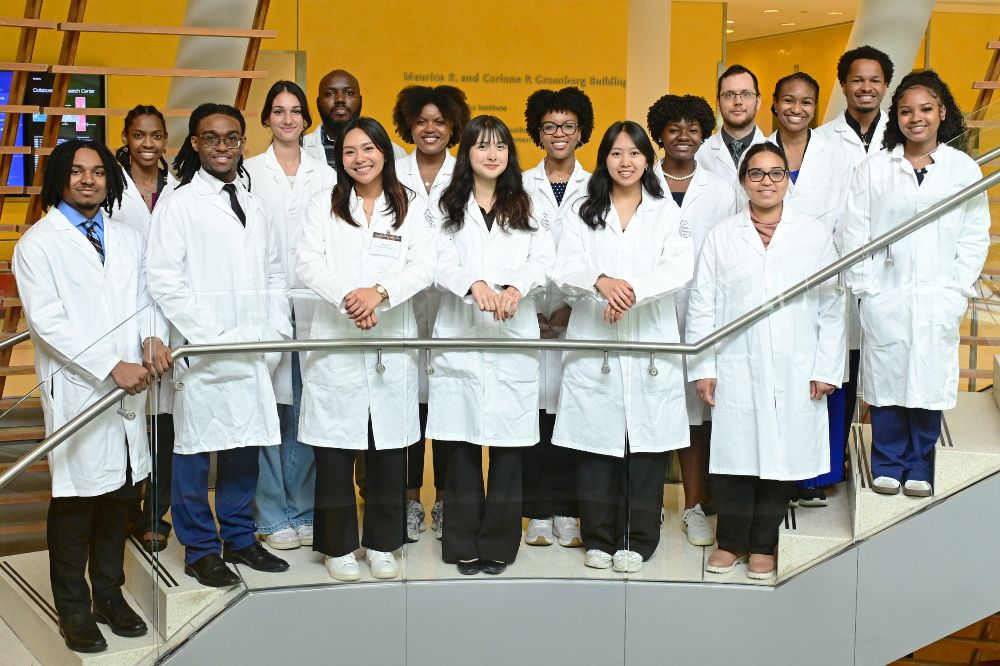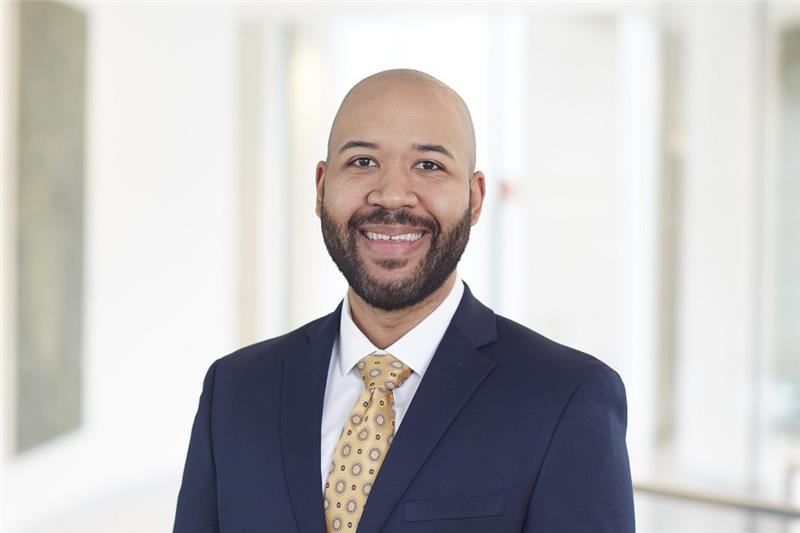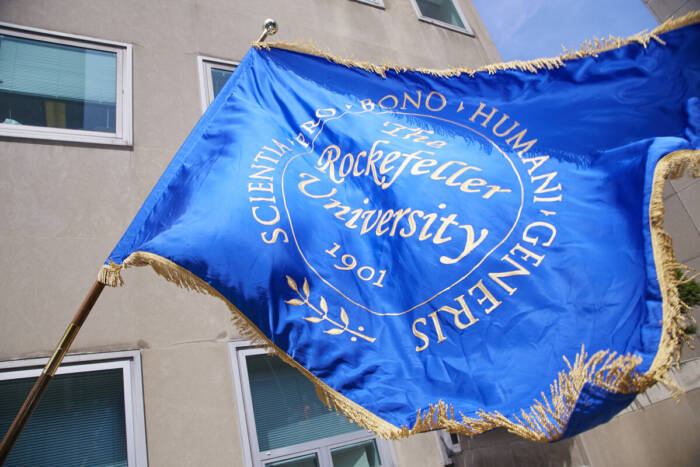Rockefeller’s Rising Scholars Workshop opens doors to science

The 13 rising scholar participants and their Rockefeller mentors.
For 13 college students, a mid-May visit to Rockefeller was more than a crash course in research. It was an invitation to envision themselves as scientists.
Nominated by their home institutions, the students came to campus for the Rising Scholars Workshop, a four-day program that blended scientific exploration with professional development. Designed for rising sophomores and juniors, the initiative seeks to expand the graduate school pathway by building lasting partnerships with colleges that have not historically sent students to Rockefeller.
“We want these students to leave knowing that Rockefeller is a place where they’re welcomed and supported,” said Ashton Murray, vice president for University Life and Community Engagement, who launched the initiative. “At the same time, we hope their institutions will see us as a committed partner in championing their students’ growth.”

This is the second iteration of the Rising Scholars Workshop, which Rockefeller first hosted in spring of 2023.
“Our office created this experience to help students understand what it’s like to do research at Rockefeller,” Murray said. “It’s also a way to show them that a future in science is within reach—and that they’ll have the resources and opportunities to support them along the way.”
Experiencing science firsthand
The students represented a wide range of institutions, including Howard University, North Carolina A&T, Spelman College, Morehouse College, UNC Chapel Hill, and the University of Maryland, Baltimore County. Each was paired with a Rockefeller graduate student host and took part in either a neuroscience and behavior track or a microbiology module.
Mornings were spent in sessions with faculty and the graduate student team. Afternoons focused on hands-on lab work. Evenings brought shared meals, informal meetups, and a Broadway outing to see the musical “Six.”
“We wanted them to experience what it’s like to do science at Rockefeller,” said Chad Morton, program specialist in University Life and Community Engagement. “Not just learning about research, but actively participating in it while learning from and engaging with students and postdocs about their own journeys.”
A Rockefeller PhD alum, Morton led the neuroscience track, where students investigated how fruit flies use odor plumes to navigate their environment. “The goal wasn’t just for them to do another lab,” he said. “It was to create a scientific experience where they could actively engage in research: asking questions, designing and implementing experiments, thinking critically, and expressing their ideas clearly.”
From day one, students were immersed in the scientific process: developing hypotheses, conducting experiments, analyzing data, and interpreting results. With support from members of the Laboratory of Neurophysiology and Behavior, led by Vanessa Ruta, and guidance from Morton, they carried out behavioral experiments to explore how changes in sensory information shape navigation in fruit flies. Using a cost-efficient rig design developed by the Reiser Lab at the Janelia Research Campus, students built their own experimental setups from 3D-printed and laser-cut parts fabricated in Rockefeller’s Precision Instrument Technology facility, along with low-cost materials. They also learned to analyze their data using Python, gaining hands-on experience in both experimental and computational aspects of neuroscience. The project highlighted the interdisciplinary nature of the work and offered a window into real-world neuroscience research.
“I hadn’t realized how much biology, coding, and engineering overlap,” said Justin Frazier, a rising sophomore at North Carolina A&T from Patchogue, New York. Frazier, who is weighing future paths in medicine and research, said the experience helped clarify what he’ll need to move forward.
McKenzie Williams, a sophomore at Howard University and a Karsh STEM Scholar, connected with the opportunity on a personal level. “My mom always says, ‘You can’t be what you can’t see.’ And this gave me something to see,” she said. Williams, who plans to pursue an MD/PhD, is spending her summer at Yale doing immunology research through the Amgen Scholars Program. “Being at Rockefeller made the idea of grad school tangible. It’s no longer some distant goal.”
Building communication skills
In the microbiology module, led by postdoctoral associate Jan Burian, students studied the physical characteristics of bacterial colonies and how these traits can offer clues about species or environmental conditions. Burian stressed the importance of sharing findings clearly and concisely.
“Stay on message. Be mindful of your audience,” he told students. “Talk about what you did and what you found. That’s what people will remember.”
Burian encouraged students to fine-tune their delivery, improve their visuals, and consider how to make their science resonate with scientists and non-scientists alike. “Communicating your work is just as essential as conducting it,” he said.
That message came through during Friday’s final presentations. In front of faculty, mentors, and peers, each student walked through their research process, interpreted results, and reflected on what they’d learned. Some were nervous; others took the spotlight with ease and confidence. All were engaged and proud to share their work.
“They were discovering their voice as scientists,” said Morton.
A lasting investment
The week also featured sessions on resume-building, guidance from Emily Harms, senior associate dean for graduate studies, and Andrea Morris, assistant dean and director of career and professional development, and informal conversations with Rockefeller students. Participants received professional headshots for use in applications and LinkedIn profiles, just one of several practical tools they took away.
For Frazier, inspiration struck during a dinner conversation. “These are students who look like me, doing amazing things,” Frazier said. “Black men and women are still underrepresented in science and medicine. We need mentors and role models to show us what’s possible.”
Williams, raised in Boca Raton, Florida, felt similarly after hearing a graduate student panel. “One of them talked about how she was told her school list was too ambitious—yet she got in. That really stuck with me.”
As the week drew to a close, Murray reiterated that this was just the beginning. “We’ll stay in touch with these students,” he said. “We want to be part of their journey—through college, grad school, and beyond.”
For many, that journey now feels more attainable.
“This experience was like no other,” said Williams. “I know what I want to do. And now, I know how to start.”


